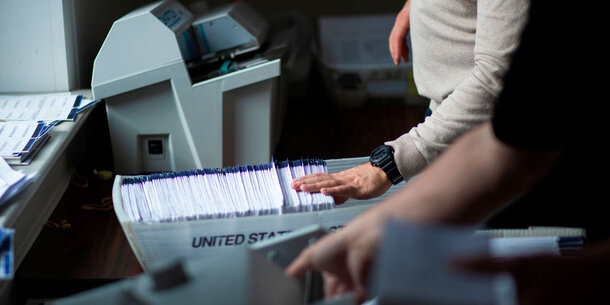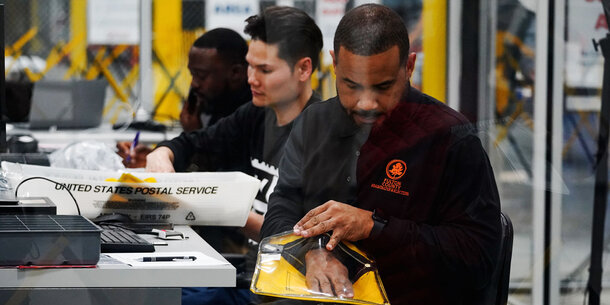This was originally published by Election Center’s Journal of Election Administration, Research & Practice.
Abstract
Although election officials have successfully managed recent election cycles amidst significant challenges, they have faced a relentless onslaught of attacks fueled by false perceptions about their work. As part of a multifaceted response to these attacks, election officials should elevate the ethical principles that guide their work to safeguard democracy. This can be achieved through the adoption of an expanded code of ethics that seeks to foster professional identity, express shared values, and promote accountability. A profession’s code of ethics establishes a foundation for expected behavior, enabling officials to navigate complex challenges while aligning with their values. Equally important, a code of ethics communicates shared values to the public, enhancing credibility and facilitating explanation of difficult decisions. For this effort to have success, election officials themselves must drive the effort, with the Election Center playing a pivotal role in leading and supporting this vital work.
• • •
Through historic turnout and unprecedented security, safety, and logistical challenges, election officials across the country have run elections with remarkable success in recent cycles — adjusting to meet changed circumstances, minimizing issues for voters casting their ballots, and delivering accurate vote counts. Despite this, election officials have simultaneously endured a barrage of attacks driven by false perceptions about their work. These attacks have included outright threats and harassment from members of the public taken in by false accusations of election fraud, irrational public records requests that drain time and resources, partisan political pressure and intimidation, and even vitriol from officials’ own communities, whom they sacrifice so much to serve.1
These attacks require a multifaceted response, but one thing election officials themselves can do as a profession is to lift up the ethical principles that guide their work to safeguard democracy. The profession should start by adopting and then publicizing an expanded code of ethical principles to which all its members commit to adhere.
Codes of ethics are important in shaping professional identity, expressing values, and holding colleagues accountable. A profession’s code of ethics creates a baseline set of expectations for how its members should behave, helping individuals navigate complex challenges in a manner that aligns with the profession’s values. Equally important, a code of ethics communicates the profession’s shared values to the wider world, helping to build public credibility and providing a narrative structure to help members of the profession explain some of their most difficult decisions to those impacted and the broader public.
The Election Center organized and developed the first code of ethics for election officials decades ago. While that code still reflects the profession’s key values, the changing political environment surrounding election administration has made it more important than ever to elaborate on what those values mean in practice through an expanded code. That expanded code must be specific enough to provide concrete guidance while still retaining enough flexibility to adapt to different situations. It must transcend ordinary political and ideological disagreements and account for the practical realities that structure how election officials do their jobs. Finally, once it settles on ethical standards, the profession must determine how to hold its members accountable for following them, which may vary by state and jurisdiction.
Above all, every aspect of this process, from developing a revised code, to implementing it in different jurisdictions, to training new officials in its principles, must be driven by members of the profession and have their full buy-in. The Election Center, as the National Association of Election Officials, is ideally positioned to lead this important work and help the profession reinforce the vital role it plays in our democracy.
Codes of ethics play a critical role in shaping professional identity, expressing values, and holding colleagues to a common set of expectations.
Through standards expressed in their code of ethics, the members of a profession establish agreed-upon expectations that define their professional culture. Such standards contribute to a shared professional identity and set values that guide professionals in performing their duties, especially in challenging situations where they may be subject to competing obligations (such as a lawyer’s duty to obey a client who asks her to lie versus her duty to uphold the integrity of our broader system of justice) or moral quandaries (such as doctor asked to prescribe a treatment she knows to be futile).
But ethical standards do not exist only to guide members of the profession themselves. They are also critical to explaining the profession’s shared values to the wider world and setting expectations for how members of the profession will make tough decisions that impact others. That is part of why many leading professions developed ethical codes in the first place — not only to regulate their own members but to signal their values and establish credibility with the broader public.2
While the election administration field is unique in many ways, the profession shares many characteristics with other public professions that have developed and rely on a robust code of ethics, such as judges and prosecutors.3 Like these other groups, election officials depend on a strong professional identity to enforce standards within the community and establish the public trust that is essential to their function. They routinely exercise significant discretion, often in high-stakes, high-profile situations of great concern to powerful outside interests and the broader public. And no matter their partisan affiliation, they must maintain a degree of independence from other organs of government and political officials. All of these factors, coupled with the changed political circumstances discussed below, weigh in favor of developing an expanded set of ethical principles to guide election officials themselves and help others understand the values animating their work.
A changing political environment surrounding election administration makes it more important than ever for election officials to have a more detailed code of ethics explaining their values to the public.
The Election Center organized and developed the first code of ethics for voter registrars and elections administrators in 1997. The “Standards of Conduct for Election/Registration Officials” still in use today lists a series of pledges that election officials agree to uphold, expressing values such as competence, accountability, honesty, impartiality, equality, transparency, flexibility, efficiency, and integrity. This document, however, does not fully explain the strong norms and values that election officials live by in their day-to-day work and that are more fully reflected in the Center’s training programs, which the public does not see.
The environment surrounding election administration has changed significantly in recent years, in ways that make it more important than ever for the profession to elaborate on its values and articulate those values to the outside world. For one, increasing politicization of election administration has generated partisan and ideological controversy to a degree that was not present even a decade ago. In a recent nationwide survey of local election officials that the Brennan Center conducted, 56 percent of respondents—including large numbers of Democrats, Republicans and Independents—reported being very or somewhat worried about political leaders engaging in efforts to interfere with how their fellow election officials do their jobs.4
Beyond political pressure, election officials are facing an uptick in hostility from the public, fueled largely by disinformation. Our survey found that nearly one in three respondents had been harassed, abused, or threatened because of their job, and 45 percent expressed concern for the safety of other election officials and workers in future elections.5
Finally, there is a sense among many in the profession that the role of election officials has changed. In too many cases, they have become the last line of defense in ensuring an orderly and accurate process for casting and counting votes where other public actors are not living up to their own obligations to uphold democracy. Under these circumstances, public trust and credibility are even more imperative.
This changing environment — alongside operational challenges like shifts in the law, high turnover, and changing technology — present a need and opportunity to revisit the Election Center’s code. A more detailed code of ethics, along with public education about its contents, can help the public to understand the responsibilities of election officials, how they carry out those responsibilities, and what their values are. Specifically, a new code of ethics that includes more detailed guidance on how to implement principles in practice could have the following benefits:
- Providing a public rationale for election official decisions. When an official exercises his or her discretion, ethical guidelines could provide a public rationale to help explain that choice to voters and fill a narrative vacuum that often exists when partisan actors launch misleading attacks on election officials’ decisions.
- Offering protection and insulation from political actors. Election officials could point to clear and public ethical guidelines when facing pressure from partisan actors to take a particular action, as a means of resisting that pressure.
- Setting a benchmark against which election officials’ decisions can be judged. Political leaders, media, and members of the public would be able to refer to guidelines to judge the officials’ conduct when they otherwise may not know enough about election administration to do so.
- Helping election officials navigate challenges. Finally, clear ethical guidelines could establish a range of best practices for serving the public interest to help election officials determine how to exercise their discretion. While this may provide little additional benefit for experienced election officials, these guidelines could be especially helpful for new officials entering the profession or for officials confronted with novel dilemmas.
While no document could deter all irresponsible or harmful conduct, a code of ethics sends an important message to the wider profession, other governmental institutions, and the public, and can help provide a shield for the overwhelming majority of election officials who consistently seek to carry out their public responsibilities with the utmost integrity.
What should an expanded code of ethics look like?
An expanded code of ethics for election officials must help them meet today’s challenges. While the end-product could take many forms, we believe that certain factors should be considered in its development.
Most importantly, an effective code should be detailed and precise enough to provide real guidance to election officials who face difficult situations and need to explain their decisions to the public. However, a profession whose activities are already subject to many different laws and regulations does not necessarily need yet another set of hyper-specific rules. A better approach is to develop meaningful standards that are still broad and flexible enough to be adapted to different circumstances, alongside case studies illustrating how those standards might apply in certain common scenarios. The document should not be static. Finding the right balance is likely to require revisiting the document regularly and updating as needed.
Second, any expanded code must make clear that ethics transcend politics: principles such as the need to follow the law, treat voters, candidates, and political leaders impartially, and practice transparency must apply regardless of partisan or policy disagreements.
Third, a code of ethics must account for the practical realities that shape how election officials operate. For example, in the United States many election officials are themselves elected or appointed by political parties. A code cannot demand that they conduct themselves in a wholly nonpartisan fashion, but it can set the expectation that they will deal impartially with all voters, candidates, and parties when conducting an election. Similarly, resource constraints may determine what is realistic for a particular official or office to achieve. Guidelines should encourage innovation and proactive service improvements, but not insist on standards that are unattainable.
Finally, once ethical standards are set, election officials will need to decide how to hold members of their profession accountable for upholding those standards. Here, as with election administration itself, there is no one-size-fits-all solution — while shared values should apply to all election officials, how officials implement the standards and use them to promote accountability will likely vary by state and by jurisdiction. Accountability mechanisms must reflect the different laws, administration structures, and professional organizations that guide election officials’ responsibilities and relationships to their voters.
Above all, a code of ethics must have buy-in from election officials themselves.
The process of developing a code of ethics, and determining how that code should be used, must be driven by election officials from the outset. Without their buy-in, election officials may not feel committed to or represented by the principles. A code that is imposed upon election officials may become another tool used to persecute election officials who already feel under constant attack — perhaps pushing even more dedicated public servants out of a profession beset by retention issues.6
Instead, we believe — and our research into other successful codes of ethics has shown — that an expanded code of ethics must come from and be responsive to the needs of the profession itself. It is election officials and those who work closely with them who must shape the process for developing an expanded code and determine the standards it will embody.
As the national association of election officials, the Election Center is well-positioned to facilitate this important work. The Center has unique relationships with election officials across the country and understands the myriad and evolving concerns in the profession. Its role providing continuing education for election administrators also makes it an excellent fit to convene the community and host discussions to ensure that any final product reflects diverse feedback.
By prioritizing buy-in from election officials at the outset, the Election Center can ensure that its code of ethics is suitable for all election officials, whether or not they are members, and that its code can be adopted by state associations and individual election offices as a commitment of accountability to their voters.
• • •
The current attacks on election administration call into question some of the most basic foundations of our democracy. Too often, they stem from false perceptions about how election officials actually do their work. The development of an expanded code of ethics is a critical component of how the profession can meet this challenge and reinforce what election officials themselves already know: that the overwhelming majority carry out their duties with the utmost integrity.
Endnotes
-
1
Brennan Center for Justice and Bipartisan Policy Center, “Election Officials Under Attack,” June 16, 2021, https://www.brennancenter.org/our-work/policy-solutions/election-officials-under-attack.; Meredith Moran, “Misinformation, Frivolous Record Requests Bog Down Election Offices,” National Association of Counties, October 10, 2022, https://www.naco.org/articles/misinformation-frivolous-record-requests-bog-down-election-offices; Will Wilder, Derek Tisler, and Wendy Weiser, “The Election Sabotage Scheme and How Congress Can Stop It,” Brennan Center for Justice, November 8, 2021, https://www.brennancenter.org/our-work/research-reports/election-sabotage-scheme-and-how-congress-can-stop-it; Jane Timm, “Hounded By Baseless Voter Fraud Allegations, An Entire County’s Election Staff Quits in Virginia,” NBC News, April 10, 2023, https://www.nbcnews.com/politics/elections/buckingham-county-virginia-election-staff-quits-baseless-voter-fraud-rcna76435. -
2
See, e.g., Jeanne F. Backof, and Charles L. Martin. “Historical Perspectives: Development of the Codes of Ethics in the Legal, Medical and Accounting Professions.” Journal of Business Ethics 10, no. 2 (1991): 99–110. http://www.jstor.org/stable/25072136. -
3
United States Courts, Code of Conduct for United States Judges, United States Courts, https://www.uscourts.gov/judges-judgeships/code-conduct-united-states-judges; Criminal Justice Standards for the Prosecution Function, American Bar Association, https://www.americanbar.org/groups/criminal_justice/standards/ProsecutionFunctionFourthEdition/. -
4
Local Election Officials Survey – April 2023, Brennan Center for Justice, April 25, 2023, https://www.brennancenter.org/our-work/research-reports/local-election-officials-survey-april-2023. -
5
Local Election Officials Survey – April 2023, Brennan Center for Justice, April 25, 2023, https://www.brennancenter.org/our-work/research-reports/local-election-officials-survey-april-2023. -
6
Our survey found that 21% of officials will be serving in their first presidential election in 2024. Local Election Officials Survey – April 2023, Brennan Center for Justice, April 25, 2023, https://www.brennancenter.org/our-work/research-reports/local-election-officials-survey-april-2023.




